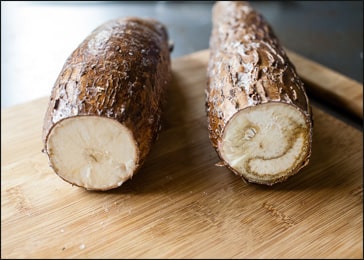
What is Yuca (Manihot Esculenta)?
Yuca (Manihot Esculenta) is an edible plant widely consumed in many countries and also has been used in Ayurveda from centuries due to its great medicinal properties. The plant is native of South America and cultivated in the Tropical and Subtropical region of other countries. It is very helpful for the treatment of arthritis, muscles spasm, hair problems, ulcer, wound healing, high blood pressure, inflammation, various skin disorders and also in the purification of blood. The herb is a major source of good calories and carbs.
People of developing countries have been using this beneficial herb due to its great nutritional value. Manihot Esculenta contains carbs, calories, fibers, minerals such as thiamine, phosphorus, calcium, and riboflavin. Boiled roots of cassava are the rich source of iron, vitamin C and niacin. When you processed or overcooked the cassava roots, it automatically reduces the nutritional value of the herb. So it should be better if you eat it in boiled form because the vitamin C content in the Manihot Esculenta is sensitive to heat.
Cassava plant can grow up to the height of 4m and harvested 9-12 month after planting. The roots are tapered, long and starchy. The roots are rough, cylindrical, tapered, brownish and very rich in starch. The leaves of the cassava are a good source of protein and show resemblance with the castor oil plant. The herb is indigenous to Brazil and belongs to the Euphorbiaceae family. The herb is a woody plant with erect stems which are spirally arranged. The leaves are simple, lobed with petiole up to 30 cm in length. Cassava plant is the third largest source of carbohydrates food, after rice and maize.
Classification
- Kingdom: Plantae
- Subkingdom: Tracheobionta
- Superdivision: Spermatophyta
- Division: Magnoliophyta
- Class: Magnoliopsida
- Subclass: Rosidae
- Order: Euphorbiales
- Family: Euphorbiaceae
- Genus: Manihot mill
- Species: Manihot esculenta crantz
What are the Nutrients Content of Yuca?
A 100-gram of boiled cassava contains almost 112 calories, 98% carbs and the small amounts of proteins and fat. It also contains fibers, minerals, and vitamins in it.
- Calories: 112
- Carbs: 27grams
- Fiber: 1 gram
- Calcium: 2% of the RDI
- Thiamine: 20% of the RDI
- Phosphorus: 5% of the RDI
- Riboflavin: 2% of the RDI
Along with this, it also contains a small amount of iron, niacin and vitamin C. the herb is the richest source of resistant starch which has similar properties such as soluble fiber. The resistant starch prevents your gut from the bacteria and ultimately reduce the inflammation and promote the digestive health.
What are the Health Benefits of Yuca?
Skin Benefits
The peel of the cassava is an excellent source of many vitamins and minerals which act as a great remedy for skin problems. The herb act as a great face mask which can easily improve the texture of your skin and make it more smooth and glowing. The mask of cassava roots with honey and olive oil can helps to hydrate your skin, eliminates the scars and import the healthy glow in return.
Hair Benefits
The leaves and the roots of the cassava plant are used to make a fresh paste that can be applied on your scalp and hair an hour before you rinse your hair. It will nourish your hair, reduce the hair fall, and hydrate hair from root to tip. The leaves of the cassava are a rich source of calcium, iron, vitamin B, C, and starch. All these nutrients help to repair all the damage.
Improves Digestion
The herb contains a good amount of fiber, which helps to improve your digestive health and also helps in absorption of toxin which enters in your intestine. It is beneficial during the diarrhea problem.
Treat Fever
Leaves and the stem of the cassava are used as a decoction during fever. The herb also reduces the various symptoms of fever and provide the relief from it.
Treat Rheumatic Arthritis
Cassava herb contains minerals such as magnesium, which reduce the chances of rheumatic disease. During arthritis problem, there is severe pain in joints and can also cause inflammation. Magnesium also maintains the high blood pressure and ultimately reduce the risk of osteoporosis. The herb also contains vitamin K which play a potential role in bone strengthening by stimulating the activity of osteoplastic cells in the bones.
Develop Appetite
The cassava herb is also beneficial for the restoration of appetite. To improve your appetite, make a blend of cassava leaves with ginger and drink it every morning with an empty stomach. The leaves of the cassava also prevent and remove the infection of nematodes in the gastrointestinal tract.
Boost Immunity
The folate and vitamin C content of cassava leaves boost your immune system by attacking harmful viruses and bacteria. The antioxidant property of herb helps to eliminate the free radicals in the body and reduce the oxidative stress.
Beneficial for Nerve Health
The herb reduces the stress and anxiety problem and maintain the overall health of your nerve system.
